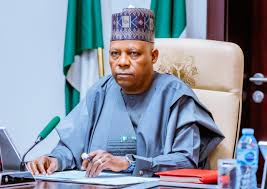Vice-President Kashim Shettima has said the Nigeria4H2 Project is designed to unlock the country’s vast and largely untapped potential in green hydrogen, with the aim of transforming the economy and securing Nigeria’s relevance in the evolving global energy market.
Shettima made this known while declaring open the Nigeria4H2 Project Results Workshop and End-of-Project Stakeholders’ Interaction on Friday in Abuja.
The Nigeria4H2 Project was initiated through collaboration among the West African Science Service Centre on Climate Change and Adapted Land Use (WASCAL), Federal University of Technology Akure, Afe Babalola University, and Federal University of Technology Minna.
The project assessed Nigeria’s technical, infrastructural, regulatory, and investment capacities necessary for harnessing green hydrogen to power transportation, generate electricity, and manufacture fertilisers based on green ammonia.
Correspondents gathered that one of the key findings is that Nigeria could produce up to four million tonnes of green ammonia annually.
Represented by Dr Tope Fasua, Technical Adviser to the President on Economic Matters, Shettima emphasised that the global shift towards cleaner energy demanded urgent domestic alignment.
In his address, titled “Unlocking Nigeria’s Green Hydrogen Potential: A Renewed Hope for a Sustainable Future,” the vice-president described the project as a strategic national response to a global transition.
He said green hydrogen, derived from renewable sources like solar and wind, offers a promising route to diversify Nigeria’s energy mix, lower emissions, and create new economic opportunities.
“Nigeria is uniquely positioned to become a leader in this burgeoning industry. We are blessed with an abundance of sunlight and wind, resources that can be harnessed to generate clean electricity required for green hydrogen production,” he said.
“Our strategic geographical location and our skilled, youthful population provide the essential ingredients for a successful and scalable green hydrogen economy.”
Shettima stressed that the global energy paradigm had shifted permanently and that the move toward a sustainable, decarbonised future was now an urgent imperative.
He praised the Energy Commission of Nigeria for providing a platform to deliberate on the project and described the initiative as central to President Bola Tinubu’s Renewed Hope Agenda.
“The Nigeria4H2 Project is designed to unlock Nigeria’s vast and untapped potential in green hydrogen. It is a clean, versatile and abundant energy carrier that can revolutionise our economy and secure our place in the 21st-century energy market,” he said.
He described the project as a “mosaic of public-private partnerships, international collaboration, and domestic innovation,” calling for full participation from all sectors.
On the economic benefits, Shettima noted that positioning Nigeria as a green hydrogen producer and exporter would open new revenue streams, reduce dependency on fossil fuels, and attract foreign direct investment.
He also highlighted the social and environmental advantages, such as improved public health and enhanced climate action.
“This is our moral duty to our children and to the planet,” he added.
He described the workshop as a crucial stage in the project’s development and called on stakeholders to identify potential challenges and develop a unified roadmap using collective expertise.
(NAN)


